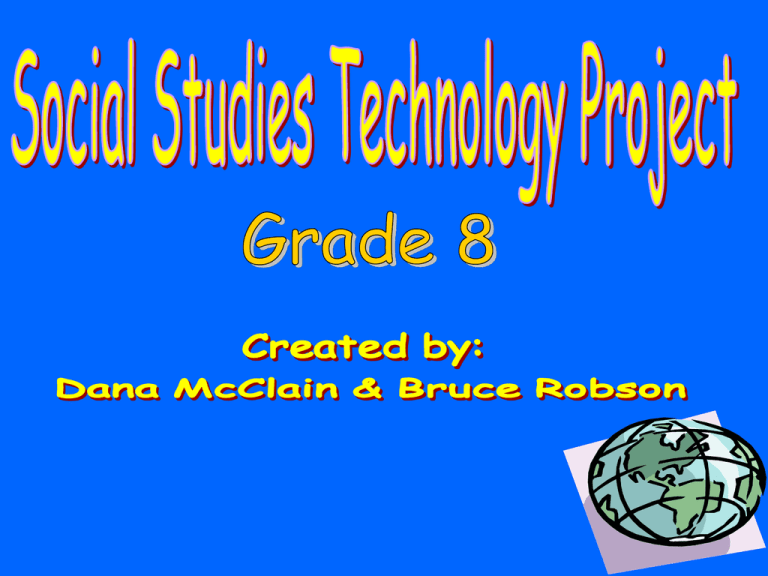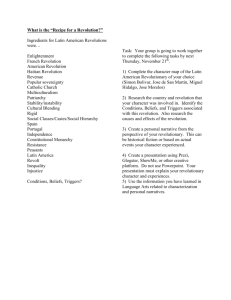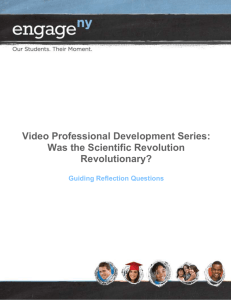Dane Mcclain / Bruce Robson
advertisement

This eighth grade technology unit is designed to conform to the six social studies strands from the Ohio Department of Education’s Competency-Based Model. The study of world and national history is essential for students to gain perspectives on today’s happenings. GOAL •Our overall goal is to utilize all six social studies strands in teaching a unit on the American Revolution. Upon completion of this unit, students will be able to… •Identify significant historical developments preceding and during the American Revolution and explain their importance. •Discuss the impact of the Native Americans siding with the British during the American Revolution. •Using mapping skills, locate significant battle sites of the American Revolution. •Explain the economic factors motivating the independence movement of the British colonies in North America. •Discuss the political reasons the American colonists decided to become independent from England and explain the idea of the right of self-government as represented in the Declaration of Independence. •Identify how the colonist formulated the fundamental principles of American democracy American Heritage •A Revolutionary Web Quest http://norary.thinkquest.org11685/HomeMain.htm •American Revolution & Colonial America http://www.sau29.k12.nn.usnorary/Middle/American_Revolution.htm •The History Place: American Revolution http://www.historyplace.com/unitedstates/revoltuion/ ACTIVITIES American Heritage • • • Have students re-enact the battles of Lexington & Concord Design a web diagram that relates to topics on the Revolutionary War using both pictures and words Construct a classroom bulletin board of events that lead up to the American Revolutionary War (Boston Tea Party) • • Have students read the poem about the ride of Paul Revere and write in their journals how they would have reacted if in his position. Have students develop a timeline that that covers the Revolutionary War. People in Societies •The Philadelphia Campaign 1777 http://www.ushistory.org/march/index.html •A Journey Towards Freedom http://library.thinkquest.org/10966 •Bibliographies of the War of American Independence http://www.army.mil/cmh-pg/reference/revbib/revwar.htm ACTIVITIES People In Societies • • Have students develop a web diagram of the coordinated activities of the British & the Native Americans Using past lecture information, have the students write in their journals stating whether or not they would have sided with the British, assuming that they were Native Americans • • • Have students choose either a British or Native American leader and write a two page paper discussing their importance in the Revolutionary War. Using the two page paper on an important Revolutionary figure, have the students present an oral report in front of the class. Have the class select one of the tribes that sided with the British during the war, and write a letter to current tribal leadership inquiring as to their position on their ancestors actions. World Interactions •The American Revolution http://revolution.h-net.msu.edu/intro.html •Encarta Encyclopedia:American Revolution http://encarta.msn.com/index •Liberty! The American Revolution http://www.pbs.org/ktca/liberty ACTIVITIES World Interactions • • • Construct a classroom bulletin board diagramming important troop movements during the war. Have students write an essay discussing the impact of the natural barriers on the war (mountains, rivers…) Have students re-enact General Washington’s crossing of the Delaware River. • • Using a map from the Revolutionary War, have students plot important battle sites Have students research what normal winter weather is at Valley Forge and discuss the complications that this type of climate could cause for soldiers at war. Decision Making & Resources •The American Revolution Home Page http://www.dell.homestead.com/revwar/files/index.htm •The History Channel.Com http://www.historychannel.com •Monticello.org http://www.monticello.org/resoources/people/quiz1.html ACTIVITIES Decision Making & Resources • • • Have students re-enact the Boston Tea Party Have the students create a web diagram concerning the economic factors that caused the colonies to seek independence. Have the students create a newspaper as if they were living during the time of the revolution, and discuss the economic hardships that the British inflicted upon them. • • Have the students identify the products produced profitably by the colonies Have the students discuss in their journals how they would have dealt with the economic hardships caused by the British taxations. Democratic Processes •Library of Congress http://lcweb.loc.gov •GovSpot.com http://govspot.com •White House-presidents http://www.whitehouse.gov/wh/glimpse/presidents/html/presidents.html ACTIVITIES Democratic Processes • • • Have students write letters to the 1775 newspaper advocating their independence for the colonies Have students examine the Declaration of Independence and write a two page essay discussing its ramifications Have students select a member who was present at Independence Hall (Ben Franklin etc…) and have them re-enact the signing of the Declaration of Independence • • Have the students watch the video “1776” and have a classroom discussion about their views and thoughts on the movie Have the students go on a virtual tour of Independence Hall and write in their journals discussing the experience Citizenship Rights & Responsibility •Mississippi State University – History http://msstate.edu/Archives/History/USA/Afro-Amer/text.html •The Constitution of the United States http://curry.edschool.virginia.edu/curry/class/Museums/Teacher_Guide/S ocial_Studies/The.Constitution.html •Geo World History http://www.geohistory.com/geoworld/default/asp ACTIVITIES Citizenship Rights & Responsibilities • • • Have the students create a classroom bulletin displaying key sections of the Articles of Confederation Have the students create a web diagram of what American democracy means to them Have the students write a paper comparing and contrasting the Articles of Confederation and the U.S. Constitution • • Separate the students into slave states versus non-slave states and have them voice their concerns over the proposed U.S. Constitution Have the students develop their own developing county in which, they must develop a name, a flag, and a chart to record events on for the “New U.S.” We hope that by the conclusion of this technology unit consisting of the six strands of social studies, that our students will not only have a better understanding of the many concepts that the American Revolutionary War involves, but that this unit will have sparked an interest in our students to continue learning about the American Revolution in the future as well!!! The End!!




